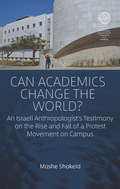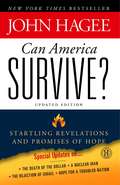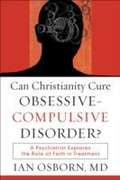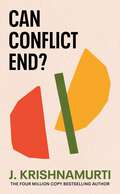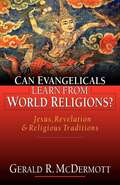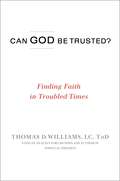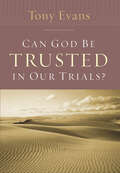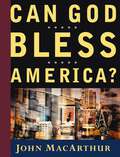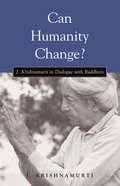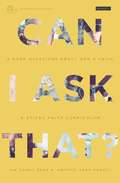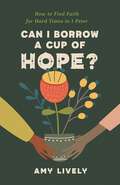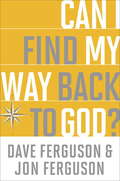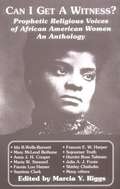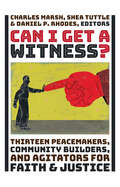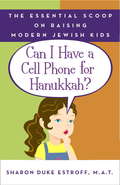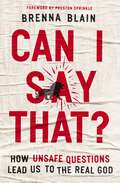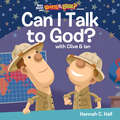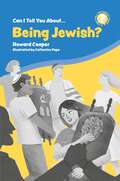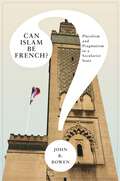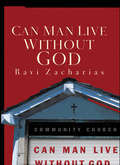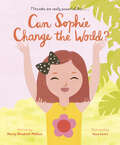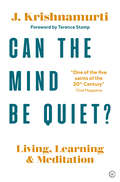- Table View
- List View
Can Academics Change the World?: An Israeli Anthropologist's Testimony on the Rise and Fall of a Protest Movement on Campus (EASA Series #39)
by Moshe ShokeidMoshe Shokeid narrates his experiences as a member of AD KAN (NO MORE), a protest movement of Israeli academics at Tel Aviv University, who fought against the Israeli occupation of Palestinian territories, founded during the first Palestinian Intifada (1987-1993). However, since the assassination of Prime Minister Rabin and the later obliteration of the Oslo accord, public manifestations of dissent on Israeli campuses have been remarkably mute. This chronicle of AD KAN is explored in view of the ongoing theoretical discourse on the role of the intellectual in society and is compared with other account of academic involvement in different countries during periods of acute political conflict.
Can America Survive?
by John HageeThis new book by New York Times best-selling author and pastor, John Hagee, says the United States is heading into a "Perfect Storm." Titanic. John F. Kennedy's assassination. 9/11. John Hagee maintains that these American tragedies all have one element in common: they were unthinkable. And in the opening pages of his newest book, Can America Survive? Hagee uses these tragedies to prove two points: that the unthinkable can happen and, given the right conditions, the unthinkable can quickly become the inevitable. In Can America Survive? Hagee asserts that the seeds for tragedy are once again being sown, evidenced by the disturbing economic, geopolitical, and religious trends that now threaten to dismantle the very nation itself. "Think it can't happen?" Hagee asks in a theme repeated throughout the book. "Think again." Indeed, Hagee presents alarming examples of recent events, current research, scientific evidence, and biblical prophecy that are gathering to create a "perfect storm" that could bring down the "unsinkable" United States of America including: The U.S.'s negligent handling of Israel, and history's evidence of the danger to any nation that challenges Israel's God-mandated right to exist The dangerous belittling of Iran's nuclear threat by careless spy agencies--and the super-weapon that could stop the U.S. in its tracks instantly The chilling biblical prophecy that confirms Iran as one of six countries that will form an Islamic military force "as a cloud to cover the land" The real $2.5 trillion price tag of healthcare reform, the international currency shifts, and the national economic trends that are poised to bring about the death of the American dollar The criminalization of Christianity around the worldCan America Survive? is not just a warning. It is a wake-up call and a rallying cry to Christian citizens everywhere to prevent the next unthinkable American disaster. After all, as Hagee points out, "those who do not remember the mistakes of the past are doomed to repeat them in the future." Think it can't happen? Think again.
Can America Survive?
by John HageeThis paperback version of Pastor John Hagee's newest book has ripped-from-the-headlines updates. New material has been added regarding the death of the dollar, a nuclear Iran, and the rejection of Israel. Further, this New York Times best-selling author says the United States is heading into a "Perfect Storm." Titanic. John F. Kennedy's assassination. 9/11. John Hagee maintains that these American tragedies all have one element in common: they were unthinkable. And in the opening pages of his newest book, Can America Survive? Hagee uses these tragedies to prove two points: that the unthinkable can happen and, given the right conditions, the unthinkable can quickly become the inevitable. In Can America Survive? Hagee asserts that the seeds for tragedy are once again being sown, evidenced by the disturbing economic, geopolitical, and religious trends that now threaten to dismantle the very nation itself. "Think it can't happen?" Hagee asks in a theme repeated throughout the book. "Think again." Indeed, Hagee presents alarming examples of recent events, current research, scientific evidence, and biblical prophecy that are gathering to create a "perfect storm" that could bring down the "unsinkable" United States of America including: The U.S.'s negligent handling of Israel, and history's evidence of the danger to any nation that challenges Israel's God-mandated right to exist The dangerous belittling of Iran's nuclear threat by careless spy agencies--and the super-weapon that could stop the U.S. in its tracks instantly The chilling biblical prophecy that confirms Iran as one of six countries that will form an Islamic military force "as a cloud to cover the land" The real $2.5 trillion price tag of healthcare reform, the international currency shifts, and the national economic trends that are poised to bring about the death of the American dollar The criminalization of Christianity around the world;Can America Survive? is not just a warning. It is a wake-up call and a rallying cry to Christian citizens everywhere to prevent the next unthinkable American disaster. After all, as Hagee points out, "those who do not remember the mistakes of the past are doomed to repeat them in the future." Think it can't happen? Think again.
Can Christianity Cure Obsessive-compulsive Disorder?: A Psychiatrist Explores The Role Of Faith In Treatment
by Ian OsbornObsessive-compulsive disorder (OCD) is a relentless condition, the primary symptom being the occurrence of terrifying ideas, images, and urges that jump into a person's mind and return again and again, despite the individual's attempt to remove them. Christians who suffer from OCD may grapple with additional guilt, as the undesired thoughts are frequently of a spiritual nature. Yet people may be surprised to learn that some of the greatest leaders in Christian history also struggled with this malady. What did they experience? How did they cope? Were they able to overcome these tormenting, often violent, obsessions? Where did God fit into the picture? Ian Osborn shares the personal accounts of Martin Luther, John Bunyan, and Saint Thérèse of Lisieux, as well as his own story, in exploring how faith and science work together to address this complex issue.
Can Conflict End?
by J. KrishnamurtiWithout the fundamental necessity of peace, we cannot possibly understand the greater things of life. With his signature insight and wisdom, world renowned thinker J. Krishnamurti offers a timely manifesto on the roots of conflict. In a series of six prescient talks, he reveals how changing our own behaviours to nurture a more peaceful mindset can create positive change for the wider world.
Can Evangelicals Learn From World Religions?: Jesus, Revelation and Religious Traditions
by Gerald R. McDermottHere is the beginning of an evangelical theology of religions that addresses the problem of truth and revelation, and takes seriously the normative claims of other traditions. <p><p> From in the introduction to Can Evangelicals Learn from World Religions? by Gerald McDermott: <p> "Arguably, the church's greatest challenge in the next century will be the problem of the scandal of particularity. More than ever before, Christians will need to explain why they follow Jesus and not the Buddha or Confucius or Krishna or Muhammed. But if, while relating their faith to the faiths, Christians treat non-Christian religions as netherworlds of unmixed darkness, the church's message will be a scandal not of particularity but of arrogant obscurantism." <p><p>"Recent evangelical introductions to the problem of other religions have built commendably on foundations laid by J. N. D. Anderson and Stephen Neill. Anderson and Neill opened up the "heathen" worlds to the evangelical West, showing that many non-Christians also seek salvation and have personal relationships with their gods. In the last decade Clark Pinnock and John Sanders have argued for an inclusivist understanding of salvation, and Harold Netland has shed new light on the question of truth in the religions. Yet no evangelicals have focused—as nonevangelicals Keith Ward, Diana Eck and Paul Knitter have done—on the revelatory value of truth in non-Christian religions. Anderson and Neill showed that there are limited convergences between Christian and non-Christian traditions, and Pinnock has argued that there might be truths Christians can learn from religious others. But as far as I know, no evangelicals have yet examined the religions in any sort of substantive way for what Christians can learn without sacrificing, as Knitter and John Hick do, the finality of Christ. "This book is the beginning of an evangelical theology of the religions that addresses not the question of salvation but the problem of truth and revelation, and takes seriously the normative claims of other traditions. It explores the biblical propositions that Jesus is the light that enlightens every person (Jn 1:9) and that God has not left Himself without a witness among non-Christian traditions (Acts 14:17). It argues that if Saint Augustine learned from Neo-Platonism to better understand the gospel, if Thomas Aquinas learned from Aristotle to better understand the Scriptures, and if John Calvin learned from Renaissance humanism, perhaps evangelicals may be able to learn from the Buddha—and other great religious thinkers and traditions—things that can help them more clearly understand God's revelation in Christ. It is an introductory word in a conversation that I hope will go much further among evangelicals."
Can GOD be Trusted?: Finding Faith in Troubled Times
by Thomas D. WilliamsFather Williams explores the most common obstacles that prevent people from trusting God, including personal betrayals, unfulfilled expectations, and seemingly unanswered prayers. He then explains what is reasonable to expect from God and offers practical tips for ways to grow in trust. Williams is becoming a revered voice in the Christian community for his insightful writings on issues that really matter to Christians. In this new book, Father Williams will help readers understand, not only how to trust God in spite of doubts and confusion, but to truly know God can be trusted.
Can God Be Trusted in Our Trials? (Tony Evans Speaks Out On...)
by Tony EvansA frequent stumbling block for Christians and non-Christians is how to handle adversity. Why aren't we promised an easy ride once we accept Jesus as our Savior? Tony's book explores why God allows trials, and then delivers practical steps for responding to them and emerging victorious!
Can God Be Trusted in Our Trials? (Tony Evans Speaks Out On...)
by Tony EvansA frequent stumbling block for Christians and non-Christians is how to handle adversity. Why aren't we promised an easy ride once we accept Jesus as our Savior? Tony's book explores why God allows trials, and then delivers practical steps for responding to them and emerging victorious!
Can God Bless America?
by John MacarthurRecently, and seemingly overnight, the once cliche slogan "God Bless America" became almost a national mantra. John MacArthur gets to the heart of the matter by asking the questions most Americans choose to ignore: "Should God bless America?" and "Is America deserving of blessing?" Turning to the Old Testament, he presents the simple truth of God's word, his blessing has always had conditions. MacArthur calls the Nation to turn back to God by showing us how we can become a nation that is once again blessed by God.
Can Humanity Change?: J. Krishnamurti in Dialogue with Buddhists
by Jiddu KrishnamurtiMany have considered Buddhism to be the religion closest in spirit to J. Krishnamurti's spiritual teaching--even though the great teacher was famous for urging students to seek truth outside organized religion. This record of a historic encounter between Krishnamurti and a group of Buddhist scholars provides a unique opportunity to see what the great teacher had to say himself about Buddhist teachings. The conversations, which took place in London in the late 1970s, focused on human consciousness and its potential for transformation. Participants include Walpola Rahula, the renowned Sri Lankan Buddhist monk and scholar, author of the classic introductory text What the Buddha Taught.
Can I Ask That? Student Guide: 8 Hard Questions About God And Faith
by Brad M. Griffin Jim Candy Kara PowellEver had a question about God that you were scared to ask? Ever felt like your hard questions get squashed, silenced, or brushed aside? We get that. We wrote this guide for people like you. And we have good news. First, other teenagers and adults ask these kinds of questions all the time. Second, it's not only okay to ask hard questions, but it's actually important-some say essential-for your faith journey. And finally, God can handle it. God isn't anxious about your questions, struggles, or doubts. We don't think you should be either.
Can I Borrow a Cup of Hope?: How to Find Faith for Hard Times in 1 Peter
by Amy Lively"Amy is a gifted teacher and her words are just the right mix of clever, funny, and profound."--Peggy Bodde, founder of Sacred WorkWhen the pain and problems of life barge in, hopes and dreams run out. In these uncertain seasons of personal crisis, national chaos, and global catastrophe, it's easy to wonder if life will ever be anything but sorrow and despair.The apostle Peter knows exactly what it's like when hope is gone. He watched as the Messiah was arrested, crucified, and buried. And Peter himself failed almost every test of his faith, even with Christ right in front of him. But he also knows that God is faithful and true, carrying us through our harshest suffering and redeeming our heaviest regrets. Bible teacher, author, and speaker Amy Lively dives into Peter's first epistle, a short letter with a lot of power, to light the way for today's struggling Christian. In this daily Bible study, she guides readers through the beautiful story of Peter and shows how he embodies the way to set our hope fully in Christ alone. With gentle honesty and a touch of helpful humor, Amy helps readers understand that when it feels like the end of the world to them, it's just the beginning of the power of Jesus."A beautiful, honest, and in-depth journey into 1 Peter. . . . You'll come away a little more humble, a little more thoughtful and introspective, and best of all, a whole lot more able to set your hope fully on Christ."--Jennifer Hayes Yates, author of Just Like Us and Seeking Truth
Can I Find My Way Back to God?
by Dave Ferguson Jon FergusonWherever You Are Right Now, You Can Move Toward God Do you believe God exists but struggle to connect with him? Do you feel like you've forgotten a God you used to know? Or do you feel that God has forgotten you? Most people say they believe in God, but many don't feel connected to God. That's just as real for long-time church attenders as it is for long-time spiritual wanderers. Many times in the course of our lives, we sense a distance between where we are and where we want to be. Dave and Jon Ferguson help you start right where you are and take the first step in finding your way back to God. Go further with the complete book by Dave Ferguson and Jon Ferguson Finding Your Way Back to God: Five Awakenings for Your New LifeFrom the Trade Paperback edition.
Can I Get A Witness? Prophetic Religious Voices of African American Women An Anthology
by Marcia Y. Riggs Barbara HolmesA chorus of voices of African-American women, from slavery times to the present, documenting the crucial links between faith and the struggle for justice.
Can I Get a Witness?: Thirteen Peacemakers, Community-Builders, and Agitators for Faith and Justice
by Charles Marsh Shea Tuttle Daniel P. RhodesHow do we transform American Culture through our religious convictions? Discover here the compelling stories of thirteen pioneers for social justice who engaged in peaceful protest and gave voice to the marginalized, working courageously out of their religious convictions to transform American culture. Their prophetic witness still speaks today. Comprising a variety of voices—Catholic and Protestant, gay and straight, men and women of different racial backgrounds—these activist witnesses represent the best of the church’s peacemakers, community builders, and inside agitators. Written by select authors, Can I Get a Witness? showcases vibrant storytelling and research-enriched narrative to bring these significant “peculiar people” to life.CONTRIBUTORS & SUBJECTS:Daniel P. Rhodes on Cesar Chavez Donyelle McCray on Howard Thurman Grace Y. Kao on Yuri Kochiyama Peter Slade on Howard Kester Nichole M. Flores on Ella Baker Carlene Bauer on Dorothy Day Heather A. Warren on John A. Ryan Becca Stevens on William Stringfellow W. Ralph Eubanks on Mahalia Jackson Susan M. Glisson and Charles H. Tucker on Lucy Randolph Mason Soong-Chan Rah on Richard Twiss David Dark on Daniel Berrigan M. Therese Lysaught on Mary Stella Simpson
Can I Have a Cell Phone for Hanukkah?: The Essential Scoop on Raising Modern Jewish Kids
by Sharon Duke EstroffHow do you help your child choose between mandatory baseball practice and Hebrew school? How can you plan a birthday party (not to mention bar or bat mitzvah party!) for your child without sacrificing your values, sanity, and pocketbook? How can you keep peace on the homework homefront? And how do you deal with Santa envy–let alone the entire month of December? As any modern Jewish parent knows, balancing family traditions and the realities of contemporary culture can be incredibly challenging. Answering questions both old and new, Jewish and secular, internationally syndicated parenting columnist and award-winning Jewish educator and mother of four, Sharon Duke Estroff illuminates the ways that Jewish tradition can be used to form a lasting, emotional safety net for modern families. Can I Have a Cell Phone for Hanukkah?is an instant classic. “A warm book full of tangible advice that will fashion children into committed Jews andmenschen; in short, into people who will be a blessing in their own lives and in the lives of all those whom they meet. ” –Rabbi Joseph Telushkin, author ofYou Shall Be HolyandThe Book of Jewish Values “Brimming with humor and strategy, love, and secret parent handshakes. ” –Melissa Faye Greene, author ofThe Temple Bombing, Praying for Sheetrock,andThere's No Me Without You “Sharon Duke Estroff has the uncanny ability to give solid, useful, and practical information on how to raise children while making you laugh out loud at the same time. ” –Stephen Nowicki Jr. , Ph. D. , ABPP, coauthor ofHelping the Child Who Doesn't Fit InandTeaching Your Child the Language of Social Success “I'm not Jewish, but I love this book. I laughed through it all while still appreciating the serious lessons it teaches. Every mom (and dad) with kids will find themselves nodding and smiling to themselves as they discover each other on every page. ” –Bonnie R. Strickland, Ph. D. , ABPP, former president of the American Psychological Association “This book belongs in the library of every parent and grandparent. ” –Atlanta Jewish Times "Can I Have a Cell Phone for Hanukkah is a valuable must-buy for all Jewish parents, and not just for Hanukkah. Not only does Estroff give practical child rearing advice but her joyful approach to Judaism is a healthy antidote to religious skeptics. " -Hadassah Magazine "Estroff’s witty, sympathetic tone and her attention to ethical matters make her a refreshing authority. ” - Jewish Living Magazine "Sharon Duke Estroff’sCan I have a Cell Phone for Hanukah? is a wise, witty, and insightful guide for parents — both Jews and non-Jews — who are faced with navigating their way through the shoals of contemporary American life. " - Deborah Lipstadt PhD, History on Trial: My Day in Court with David Irving "One of the best parenting books I've read this year. " -Five Minutes for Mom Blog "Sharon Duke Estroff has come to the rescue of parents raising children in today's 'overachieving, anxiety- filled culture,' with her concise, insightful and often hilarious guideCan I have a Cell Phone for Hanukkah?The Essential Scoop on Raising Modern Jewish Kids. " -Jewish Independent "From play dates, homework and extracurricular activities, to bar/bat mitzvah,tzedakah and Jewish holidays, with humor and insight Estroff offers suggestions for coping with the day-today challenges of Jewish parenting. . . an easy read packed with a lot of good,practical advice. " -Chicago Jewish Star "WithCan I Have a Cell Phone for Han
Can I Say That?: How Unsafe Questions Lead Us to the Real God
by Brenna BlainCan God handle our hardest questions, biggest struggles, and secret doubts?We instinctively assume he cannot. We figure giving voice to those things will bring shame, rejection, and distance from him. But what if our hard questions don't need to function as an off-ramp from Christianity but can lead us closer to his heart? What if he is not afraid of our doubts but instead reveals himself in them?In Can I Say That?, Brenna Blain brings her fresh voice to those who feel unsafe or unwelcome in the church, acknowledging the incongruity between the church's actions and believers' lived experiences. As a Bible teacher and an advocate for those who have experienced abuse, molestation, and mental health crises, she creates space for readers to be radically honest and ask tough questions—Am I safe here? Why does your presence feel so lonely, God?—while pointing them to biblical, foundational truth.Leading the way with her own raw vulnerability and authenticity, Brenna shares her journey of wrestling with God and building intimacy with him as a result. Bravely exploring these deep places with Brenna will help you:Know in your guts that God accepts you as you are—even as you question, struggle, doubt, and hurtBe reassured that he is bigger than anything you face and can handle anything you bring to himExperience his love in the most tender and needy parts of your heartEngage complex questions about the institution of the church, wrestle with its abuses, and advocate for the Body of Christ to more closely reflect his heart God sees you and knows you—better than you know yourself. He doesn't need you to change in order for him to love you. He doesn't require you to be free of struggles in order for him to be close to you. He wants you to be your true self with him and be willing to engage with him deeply, so he can wow you with the beauty of his heart and character.
Can I Talk to God?
by Hannah C. HallFeaturing beloved characters Clive & Ian from the bestselling video series What's in the Bible?, CAN I TALK TO GOD? weaves the biblical truth of God's accessibility into a fun story with delightful illustrations, teaching little learners that God is always listening. "When you're worried, sad, mad, scared, or even happy...God is a very good listener!"Ian has lost his stuffed pony. He can't find it anywhere! When his big brother Clive encourages him to and ask God to help him find it, Ian learns how much God cares, and that He wants to hear about everything!
Can I Tell You About Being Jewish?: A Helpful Introduction for Everyone (Can I tell you about...?)
by Howard CooperWhat does it mean to be Jewish? Are there different ways of being Jewish? Can you be Jewish but not religious? In this friendly guide, 12-year-old Ruth explains the different ways a person can experience being Jewish, by introducing us to her family and friends.Documenting the lived experience of being Jewish, the book contains diary entries covering festivals, rituals, ethics, and what a relationship with God entails, as well as more challenging topics such as Israel, the Holocaust and anti-Semitism. Providing an excellent starting point for discussion with children, it also includes a helpful list of recommended sources for further information.
Can Islam Be French?: Pluralism and Pragmatism in a Secularist State (Princeton Studies in Muslim Politics #43)
by John R. BowenCan Islam Be French? is an anthropological examination of how Muslims are responding to the conditions of life in France. Following up on his book Why the French Don't Like Headscarves, John Bowen turns his attention away from the perspectives of French non-Muslims to focus on those of the country's Muslims themselves. Bowen asks not the usual question--how well are Muslims integrating in France?--but, rather, how do French Muslims think about Islam? In particular, Bowen examines how French Muslims are fashioning new Islamic institutions and developing new ways of reasoning and teaching. He looks at some of the quite distinct ways in which mosques have connected with broader social and political forces, how Islamic educational entrepreneurs have fashioned niches for new forms of schooling, and how major Islamic public actors have set out a specifically French approach to religious norms. All of these efforts have provoked sharp responses in France and from overseas centers of Islamic scholarship, so Bowen also looks closely at debates over how--and how far--Muslims should adapt their religious traditions to these new social conditions. He argues that the particular ways in which Muslims have settled in France, and in which France governs religions, have created incentives for Muslims to develop new, pragmatic ways of thinking about religious issues in French society.
Can Man Live Without God
by Ravi ZachariasIn this brilliant and compelling defense of the Christian faith, Ravi Zacharias shows how affirming the reality of God's existence matters urgently in our everyday lives. According to Zacharias, how you answer the questions of God's existence will impact your relationship with others, your commitment to integrity, your attitude toward morality, and your perception of truth.
Can Religious Life Survive? An Urgent Question Confronts the Church Today
by Fr. Thomas DubayCan religious life survive by attaining a shared vision of love, humility and unity throughout the Christian world?
Can Sophie Change the World?
by Nancy Elizabeth WallaceThis is Pay It Forward meets the #BeKind movement, as seen through a Jewish principle.It's Grandpop's birthday, and all he wants is one little thing: for Sophie to change the world.He wants Sophie to do a mitzvah—something kind for others. But what exactly does that mean?As Sophie shares, teaches, helps her friends, takes care of birds, and picks up litter, she wonders which of these acts, if any, might change the world. By performing this sequence of poignant mitzvahs with an open heart, unending empathy, and a big imagination, Sophie's about to discover that what sounds like an impossible task just might be the best way to live life.In this exploration of an essential part of Jewish traditional teaching, Sophie's efforts to grant Grandpop's wish show that the smallest acts of kindness are what truly change the world.TIMELESS: Mitzvahs are a time-honored tradition and a central part of Judaic practice. This universal, timeless picture book shares a meaningful message about doing good in the world that will always be welcome and needed.A JEWISH PERSPECTIVE: This story explores an aspect of Jewish culture that is applicable to anyone interested in improving their world, making it a book that is both relevant and relatable to kids who are Jewish and non-Jewish alike.SPREAD KINDNESS: This book shows a variety of kind actions and engages with how kindness and good deeds can affect and lift up friends, family, and entire communities.BEAUTIFUL ILLUSTRATIONS: The art in this book is bright and cheerful, perfect for engaging kids and getting them excited to learn how they, too, can change the world!Perfect for:• Jewish families• Jewish schools and learning centers• Teachers• Parents looking for books about kindness
Can The Mind Be Quiet?: Living, Learning and Meditation
by Jiddu KrishnamurtiOne of the greatest thinkers of the 20th century describes a series of his encounters around the world with a wide variety of spiritual seekers. Their questions and his answers explore the nature of the lived experience, the details of profound self-inquiry and how to live a fulfilled life.These 60 chapters, with titles like "Solitude Means Freedom", "All Seeking is from Emptiness and Fear", and "Life is an Extraordinarily Beautiful Movement", carry the essence of Krishnamurti's teaching style and profoundest wisdom. Each one reflects an encounter K had at different times during the sixties and seventies. It opens with a poetic account of the location where the encounter took place, plus occasionally a description of the seeker that K has met. The chapter then moves back and forth between the seeker and the teacher, giving the reader plenty to reflect upon.This is previously unpublished material. Readers will be captivated by the luminous prose and the piercing insight. The style is enigmatic and poetical but each chapter contains more than enough for the reader to consider, perhaps as a daily practice. In the style of Paulo Coelho they have the quality of fables, but the teaching is far more profound and challenging.
